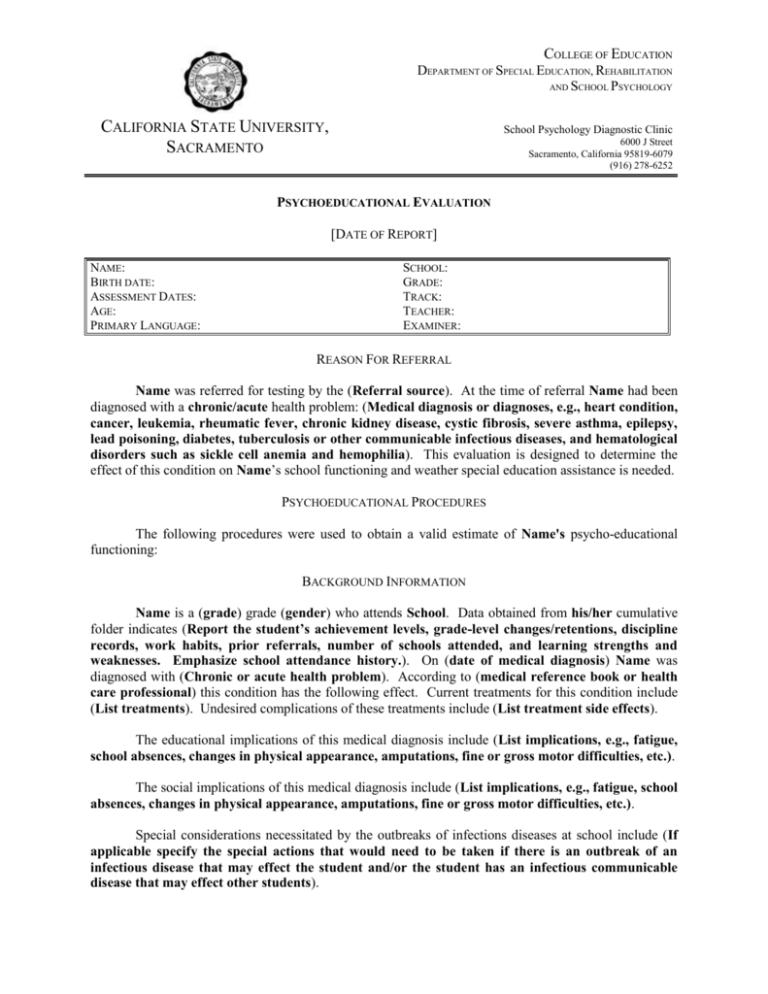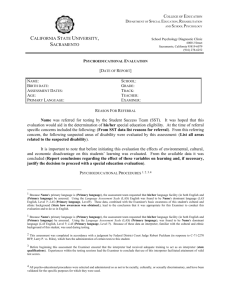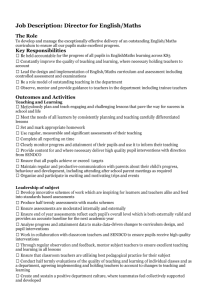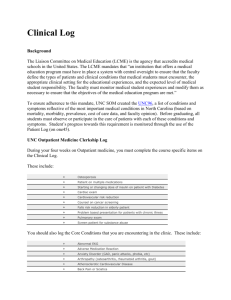OHI Report Template
advertisement

COLLEGE OF EDUCATION DEPARTMENT OF SPECIAL EDUCATION, REHABILITATION AND SCHOOL PSYCHOLOGY CALIFORNIA STATE UNIVERSITY, SACRAMENTO School Psychology Diagnostic Clinic 6000 J Street Sacramento, California 95819-6079 (916) 278-6252 PSYCHOEDUCATIONAL EVALUATION [DATE OF REPORT] NAME: BIRTH DATE: ASSESSMENT DATES: AGE: PRIMARY LANGUAGE: SCHOOL: GRADE: TRACK: TEACHER: EXAMINER: REASON FOR REFERRAL Name was referred for testing by the (Referral source). At the time of referral Name had been diagnosed with a chronic/acute health problem: (Medical diagnosis or diagnoses, e.g., heart condition, cancer, leukemia, rheumatic fever, chronic kidney disease, cystic fibrosis, severe asthma, epilepsy, lead poisoning, diabetes, tuberculosis or other communicable infectious diseases, and hematological disorders such as sickle cell anemia and hemophilia). This evaluation is designed to determine the effect of this condition on Name’s school functioning and weather special education assistance is needed. PSYCHOEDUCATIONAL PROCEDURES The following procedures were used to obtain a valid estimate of Name's psycho-educational functioning: BACKGROUND INFORMATION Name is a (grade) grade (gender) who attends School. Data obtained from his/her cumulative folder indicates (Report the student’s achievement levels, grade-level changes/retentions, discipline records, work habits, prior referrals, number of schools attended, and learning strengths and weaknesses. Emphasize school attendance history.). On (date of medical diagnosis) Name was diagnosed with (Chronic or acute health problem). According to (medical reference book or health care professional) this condition has the following effect. Current treatments for this condition include (List treatments). Undesired complications of these treatments include (List treatment side effects). The educational implications of this medical diagnosis include (List implications, e.g., fatigue, school absences, changes in physical appearance, amputations, fine or gross motor difficulties, etc.). The social implications of this medical diagnosis include (List implications, e.g., fatigue, school absences, changes in physical appearance, amputations, fine or gross motor difficulties, etc.). Special considerations necessitated by the outbreaks of infections diseases at school include (If applicable specify the special actions that would need to be taken if there is an outbreak of an infectious disease that may effect the student and/or the student has an infectious communicable disease that may effect other students). Name 2 Psycho-Educational Evaluation Developmental and Health History Pregnancy and birth history. During the parent interview Name's mother/father/stepmother/step-father (Parent's Name) indicated that (Describe pregnancy and birth history). Major developmental milestones. Developmental milestones are reported to have been (Report milestones). Health history. According to (Data source), prior to his/her diagnosis with (chronic or acute health problem), Name’s health history was (Describe history). Family history. Program Modifications Educational interventions already attempted to meet Name's educational needs within a less restrictive environment have included the following: (e.g., specialist consultations, support services, minimum day, independent study, home teaching, suspension, alternate instructional methods, parent conferences/communication, etc.). At this time, these modifications have/have not allowed Name to be successful in the general education program. The following social interventions have been attempted: [When appropriate list interventions (e.g., counseling) and their duration. Describe the outcome of these interventions]. The following specific behavior interventions have been attempted: (When appropriate list behavioral interventions and their duration. Describe the outcome of these interventions). Previous Assessment Findings Name was previously assessed in (Date of previous testing) by (Examiner). Results suggested (Results). BEHAVIORAL ASSESSMENT Adaptive Behavior Behavior Ratings Behavioral Observations Classroom. Playground. Home. Name 3 Psycho-Educational Evaluation Test Taking Behavior. Name is readily accompanied the examiner to the testing room and rapport appeared to be adequate. Rapport was... Level of activity and verbalizations were ... H/Her reaction to failure was ... Encouragement and praise resulted in ... Name's effort was consistent./inconsistent. Results are considered a valid reflection of his/her present level of functioning. PSYCHOMETRIC ASSESSMENT Intellectual Ability Academic Functioning Basic Psychological Processes Social and Emotional Functioning SUMMARY AND EDUCATIONAL IMPLICATIONS Name is a (CA) (Grade) grade (Gender) who has been assessed to help determine his/her eligibility for special education assistance. At the time of referral Name had been diagnosed with a chronic/acute health problem: (Medical diagnosis). This evaluation is designed to determine the effect of this condition on Name’s school functioning. From the available evaluation data it is concluded that Name’s health problem has an/no affect on his/her educational performance. (Present data that lead to the conclusion regarding the effect of the health problem on educational performance). From the current battery of tests the following recommendations are made: 1. From this assessment it would appear that Name meets eligibility criteria as an individual with exceptional needs. It would appear that these needs couldn’t be met without special education assistance. Specifically, Name has limited (strength, vitality or alertness), due to a chronic/acute health problem (Specify condition), which adversely affects his/her educational performance... 1. Name does not appear to meet eligibility criteria as an individual with an Other Health Impairment [according to the California Code of Regulations - Title 5, Division 1, Chapter 3, Handicapped Children, Article 3.1, Section 3030 (f)]. This conclusion is based upon the following assessment finding(s): (a) There was no data available to document the presence of either a chronic or an acute health problem. (b) At this time the diagnosed health problem would not appear to significantly adversely affect Name’s educational performance. This problem would not appear to limit Name’s ability to benefit from general education program instruction. Name 4 Psycho-Educational Evaluation (c) According to (site medical authority), the physical disability is temporary in nature as defined by the California Code of Regulations - Title 5, Division 1, Chapter 3, Handicapped Children, Article 3.1, Section 3001(af). This means that at the termination of the (health problem), Name can, without special intervention, reasonably be expected to return to his or her regular education class (d) Environmental, cultural, and/or economic disadvantage were judged to be a primary factor in Name’s poor academic and/or social functioning. 2. Additional areas of suspected disability not addressed in by the current assessment include the following: . From this observation the following additional assessments are recommended: (List additional assessments that are judged required to address all areas of suspected disability, e.g., physical therapy, occupational therapy, recreational therapy, psychotherapy, etc.). 3. The Individualized Education Program team should designate a school liaison with Name’s physician. (If appropriate specify the job title of this individual). 4. Name’s educational performance should be reassessed (specify a time interval) to assure that his/her health problem does not interfere with educational progress. 5. Specific interventions recommended to address Name’s anticipated learning needs include the following: a) Individual consultation b) Home/Hospital instruction c) Communication technology such as (instructional methods that make use of advanced communication technology). 6. 7. The final decision as to whether or not Name meets special education eligibility will be made by the individualized education program team, including assessment personnel, and will take into account all relevant material which is available on Name. No single score or product of scores, test or procedure has been used as the sole criterion for the decision of the individualized education program team as to his/her eligibility for special education. _________________________________ Stephen E. Brock, Ph.D., NCSP Licensed Educational Psychologist Name 5 Psycho-Educational Evaluation 5 CCR 3021.1 - Referral of Pupils Having a Diagnosed Chronic Illness (a) When a pupil has been medically diagnosed as having a chronic illness or acute health problem, the pupil may be referred to the school district or county office for an assessment to determine the need for special education. (b) The following information shall be reviewed by the individualized education program team: (1) (2) (c) The type of chronic illness; The possible medical side effects and complications of treatment that could affect school functioning; (3) The educational and social implications of the disease and treatment to include but not limited to the likelihood of fatigue, absences, changes in physical appearance, amputations, or problems with fine and gross motor control, and (4) Special considerations necessitated by outbreaks of infectious diseases, if applicable. The individualized education program team shall designate the school's liaison with the pupil's primary health provider. [Authority cited: Section 56100(a), (i), and (j), Education Code] [Reference: Sections 56300-56303, Education Code; 34 CFR 300.128, 300.220] 5 CCR 3051.17 - Services for Pupils with chronic illnesses or Acute Health Problems (a) Specialized services may be provided to pupils determined eligible pursuant to Section 3030(f). Such services include but are not limited to: (1) Individual consultation; (2) Home or hospital instruction; and (3) Other instructional methods using advanced communication technology. (b) (c) (d) For pupils whose medical condition is in remission or in a passive state, the individualized education program team shall specify the frequency for monitoring the pupil's educational progress to assure that the illness does not interfere with the pupil's educational progress. When a pupil identified pursuant to Section 3030(f) experiences an acute health problem which results in his or her non-attendance at school for more than five consecutive days, upon notification of the classroom teacher or the parent, the school principal or designee shall assure that an individualized education program team is convened to determine the appropriate educational services. If there is a pattern of sporadic illnesses, the individualized education program team shall convene to consider alternative means for the pupil to demonstrate competencies in the required course of study so that the cumulative number of absences do not prevent educational progress. [Authority cited: Section 56100(a), (i), Education Code] [Reference: Section 56363(a), Education Code; 34 CFR 300.14(a) (1)] 5 CCR 3030 - Eligibility Criteria A pupil shall qualify as an individual with exceptional needs, pursuant to Section 56026 of the Education Code, if the results of the assessment as required by Section 56320 demonstrate that the degree of the pupil's impairment as described in Section 3030 (a through j) requires special education in one or more of the program options authorized by Section 56361 of the Education Code. The decision as to whether or not the assessment results demonstrate that the degree of the pupil's impairment requires special education shall be made by the individualized education program team, including assessment personnel in accordance with Section 56341(d) of the Education Code. The individualized education program team shall take into account all the relevant material, which is available on the pupil. No single score or product of scores shall be used as the sole criterion for the decision of the individualized education program team as to the pupil's eligibility for special education. The specific processes and procedures for implementation of these criteria shall be developed by each special education local plan area and be included in the local plan pursuant to Section 56220(a) of the Education Code. (a) A pupil has limited strength, vitality or alertness, due to chronic or acute health problems, including but not limited to a heart condition, cancer, leukemia, rheumatic fever, chronic kidney disease, cystic fibrosis, severe asthma, epilepsy, lead poisoning, diabetes, tuberculosis and other communicable infectious diseases, and hematological disorders such as sickle cell anemia and hemophilia which adversely affects a pupil's educational performance. In accordance with Section 56026(e) of the Education Code, such physical disabilities shall not be temporary in nature as defined by Section 3001(v). 5 CCR 3001 - Definitions In addition to those found in Education Code sections 56020-56033, Public Law 94-142 as amended (20 U.S.C. 1401 et seq.), and Title 34, Code of Federal Regulations, Part 300 and 301, the following definitions are provided: (af) "Temporary physical disability" means a disability incurred while an individual was in a regular education class and which at the termination of the temporary physical disability, the individual can, without special intervention, reasonably be expected to return to his or her regular education class.








